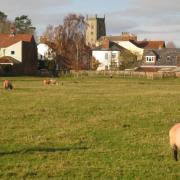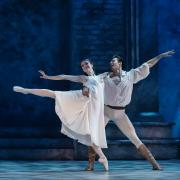A play about the late Bradford-born Andrea Dunbar – who wrote Rita, Sue and Bob Too – premieres this month in Yorkshire. Tony Greenway finds out more

There's something morbidly fascinating about artists who lived fast, burned brightly and died shockingly young, leaving behind a frustratingly small but brilliant body of work. Here are just two examples for you. In the world of music, there's singer songwriter Amy Winehouse. And in the world of theatre, there's Yorkshire playwright Andrea Dunbar.
Dunbar was a fierce, precocious talent with a working class voice from the Buttershaw estate in Bradford. She drew characters, dialogue and events from real life and wrote her first play, The Arbor, aged 15 while still at her local comprehensive. By the time she was 18, it had received its premiere at the Royal Court Theatre in London, directed by Max Stafford-Clark. But it was Dunbar's follow-up play that really announced her as a theatrical force to be reckoned with: Rita, Sue and Bob Too.
This sharp and sour comedy, about an older married man who seduces his children's babysitters, was a sensation when it received its premiere at the Royal Court in 1982; then it became controversial all over again when the film version was released in 1987, starring George Costigan, Siobhan Finneran and Michelle Holmes. Tragically, it was the last big success Dunbar tasted. In 1986 she wrote her third and final play, Shirley, and died from a brain hemorrhage four years later, aged just 29.
Dunbar's brief life is now the subject of a play by Lisa Holdsworth called Black Teeth and a Brilliant Smile, based on the non-fiction novel of the same name by Adelle Stripe.

'Rita, Sue and Bob Too came out when I was still at school,' says Holdsworth. 'I remember the backlash against it. It was a film everyone saw - certainly when it was broadcast on Channel 4 - and people had strong reactions to it.'
For starters, the laughs in both the play and the film can't mask the fact that Rita and Sue are teenage schoolgirls and Bob is a seedy middle-aged man. Also, Dunbar unsparingly presents the characters' surroundings in a grimly unflattering light, which angered Buttershaw locals at the time. 'I think Andrea was taken aback by how upset some people were,' says Holdsworth. 'There's a bit in Adelle Stripe's book where she says: 'I'm the reason that Bradford's not bouncing back.''
Dunbar wrote the screenplay for the film but was unhappy with the final movie (and particularly the end scene - where the girls are waiting for Bob in his bed - which she didn't write); but she really disliked the fame that came with it. She didn't reap any financial benefits, either. 'She was never wealthy,' notes York-born, Mytholmroyd-based Stripe. 'Because she earned an advance from the film, she was a millionaire in the eyes of a lot of people. But she wasn't. She did things like pay off her debts and buy a new sofa. She didn't even have an agent, so there was no-one looking out for her and protecting her.'
Worse, Dunbar unfairly suffered negative press and publicity. 'I think that was stressful for her,' says Stripe. 'The reviews of the film mentioned that she was an unmarried mother with three children from three different fathers. If she'd been a male writer, they would never have questioned that, but they used it as a tool to beat her with. Andrea also liked going to the pub, so there was a lot of sneering: "Look at her. She goes to the pub, she's got these kids, she lives on a council estate". The way she was treated and pilloried was mind-blowing. No wonder she was stubborn, didn't want to speak to anyone and had a chip on her shoulder.'
Even though she had massive success at the Royal Court - and was the youngest writer to have a play performed there - Dunbar felt uncomfortable with her new popularity, uneasy in London and never left Buttershaw. 'The Royal Court is very middle class,' says Stripe. 'It has real socialist roots and produced kitchen sink dramas. Yet the life that Andrea was living in Bradford was a million miles from the life of the people at that theatre. So that was a big divide for her.'
By the end of her life, Dunbar was working on a factory production line in Buttershaw. Holdsworth wonders what she would be doing now, had she lived. Maybe she'd be a massive name in theatre or TV. 'Andrea probably struggled with her mental health and had a chaotic family life,' she says. 'But if she'd sorted herself out, perhaps she'd have been writing big 'state of the nation' pieces for TV, which we really need at the moment.'
Then again, Dunbar certainly wasn't the sort of person who would compromise her talent to get in with the media in-crowd or please a TV producer. 'That's a reality for female writers: if you're uncompromising you're labelled as 'difficult',' says Holdsworth. 'I think that's less of a problem for male writers. But Andrea made such a blistering break onto the scene that, hopefully, people would have been prepared to take on the more problematic aspects of her writing style.' Both Stripe and Holdsworth think the best outcome would have been for Dunbar to be spotted, nurtured and supported by a regional theatre.
Originally, the plan was for Black Teeth and a Brilliant Smile to be performed in The Beacon, the pub on the Buttershaw estate where Dunbar died. Sadly, it's not to be. The Beacon has been boarded up and it was announced earlier this year that it's due for demolition. Instead, there will be a performance at Buttershaw Business and Enterprise College, and there are plans for a performance at Buttershaw Youth Centre.
The play aims to celebrate Dunbar's joyfulness and playfulness. 'We certainly didn't want it to be some kitchen sink drudge where her spark and humour were lost among the grim reality,' says Holdsworth. 'Adelle captures her character brilliantly in the book, so that was my biggest job: making sure Andrea's cheekiness and irreverence came out.'
Yorkshire recognises, values and celebrates many of its writers. The sad truth is that Dunbar isn't included among their number - and she deserves to be. 'For example, James Herriot wrote very lovingly about the Dales,' says Holdsworth. 'It's easy to lionise him because he's saying positive things about the place. He's not holding up a mirror and asking awkward questions about it - which is exactly what Andrea did.'
Black Teeth and a Brilliant Smile. Various venues around Yorkshire from May 30th.



























